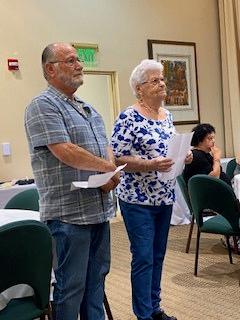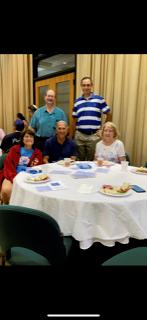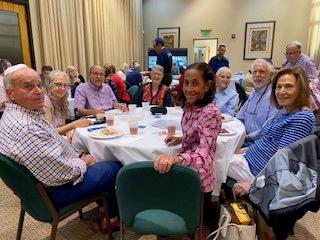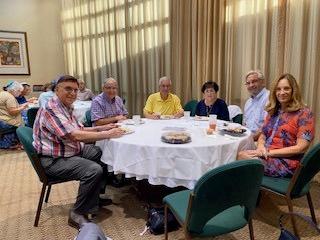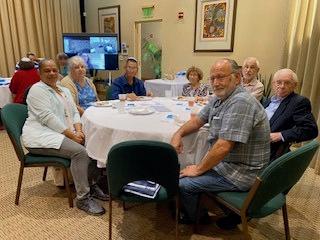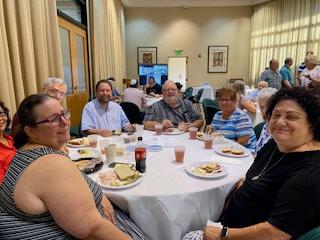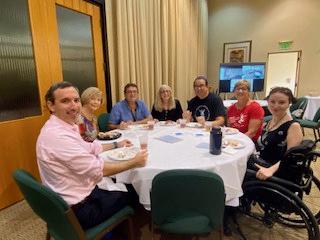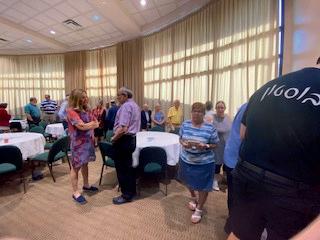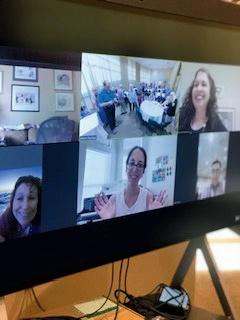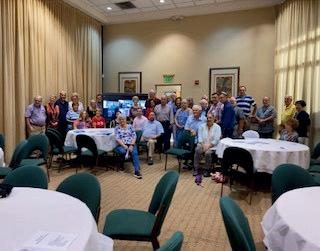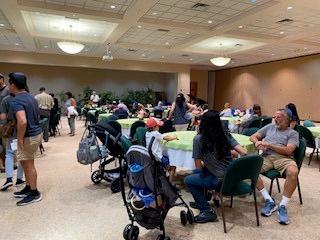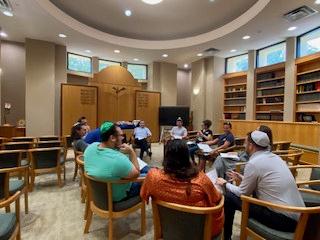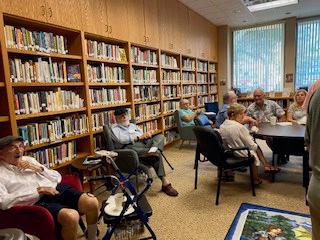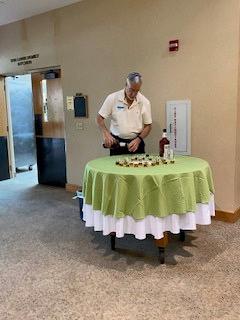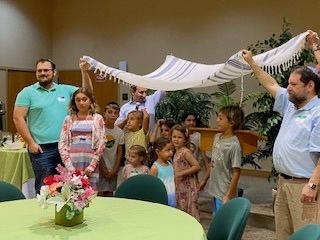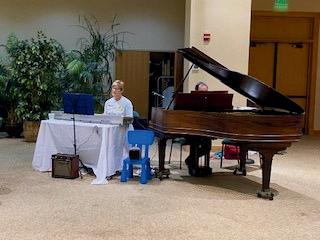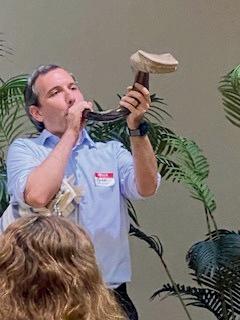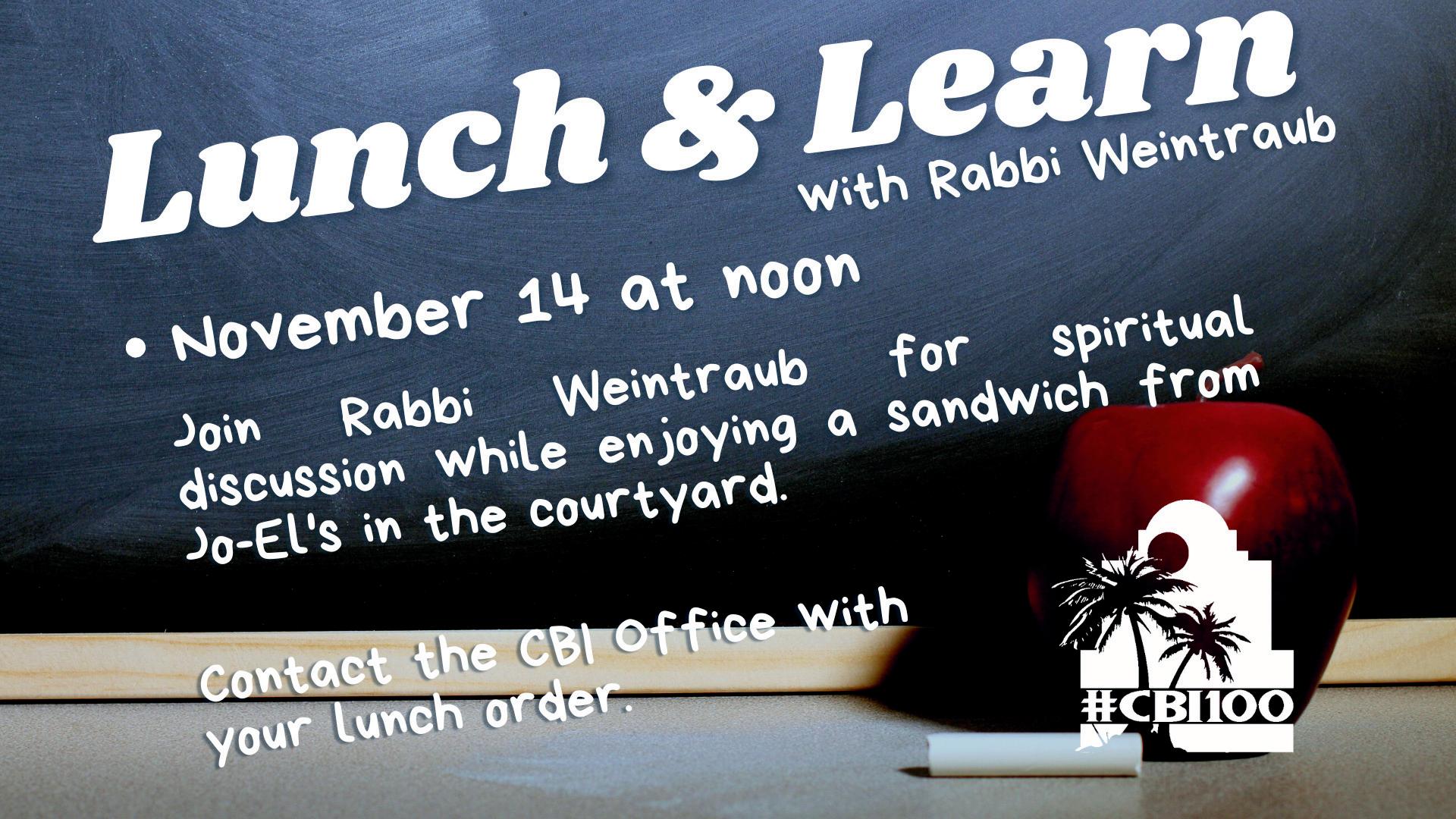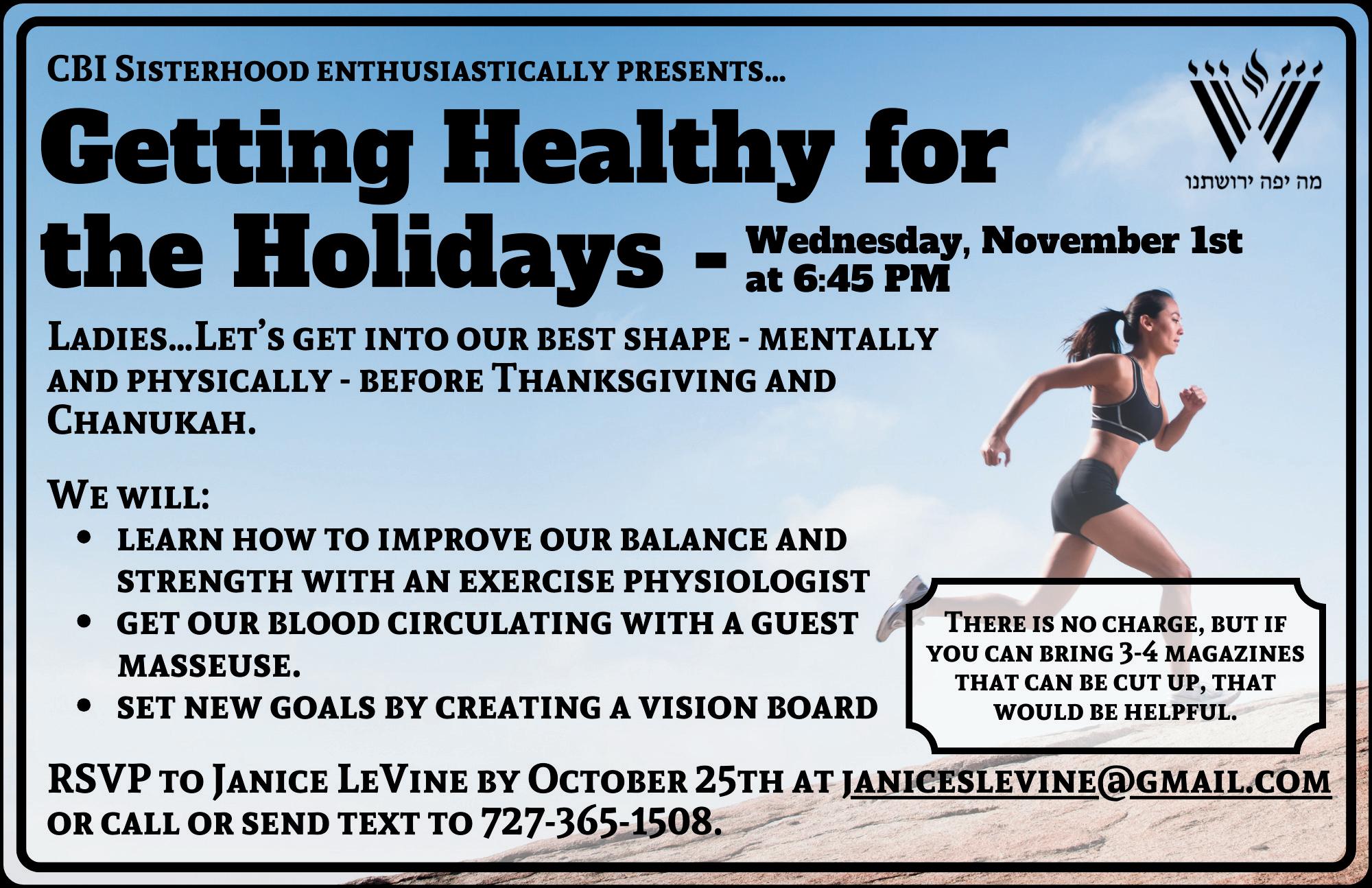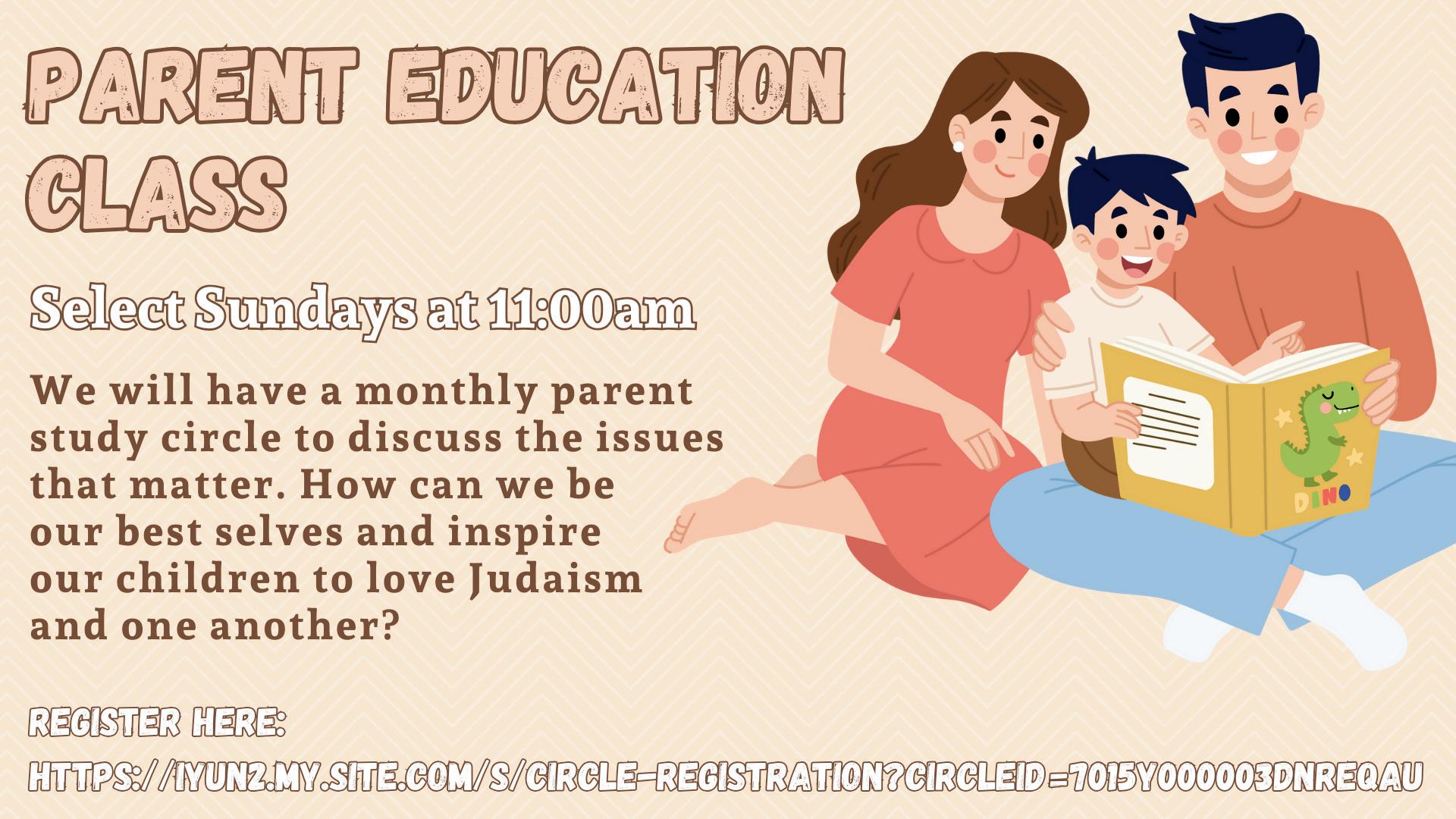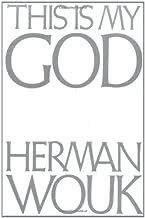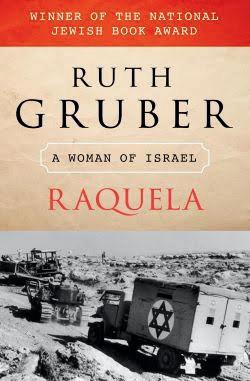CHAI TIMES at CBI CHAI TIMES at CBI



After the blessings of Rosh Hashanah and Yom Kippur, we are now in the most joyous of Jewish holidays. We are giving Thanks with Sukkot, coming together for Jews and Brews, welcoming our new members, honoring our USYers and our CBI board, and soon we will dance with the Torah.
This time of year is truly a blessing. No matter the challenges of our lives, we are reminded that we are a community. We are reminded of the sanctity of our lives, the blessings that we have, even as we acknowledge the difficulties of the world as a whole. When we give thanks, when we sing, when we dance, when we rejoice, we can anchor ourselves in the present moment, truly appreciating it.
So much of our lives we are past or future focused. So much of our tradition reminds us to look behind and ahead, yet simultaneously it demands our attention RIGHT NOW. Simchat Torah we really see this balance. We finish Deuteronomy and begin the book of Joshua AND Genesis. Amidst the holiness of that reading, we rejoice. We dance with the Torah. We sing with the Torah. In that moment all we can think about is the joy! As we celebrate in joy, I want to remind you of another way to share joy in our community. CBI has a rich history with Israel Bonds.
Israel bonds were created just three years after the modern State of Israel was born. In this year when Israel turned 75 it has never been easier to connect with Israel through the purchase of an Israel bond. The Israel Bonds program is a positive proactive economic expression of fondness for Israel. Every Israel bond purchased in 2023 is embedded with the ideals of the dreamers, founders, and builders of the State of Israel just like the first Israel bond sold 72 years ago. The funds generated by the sale of Israel bonds help grow and strengthen Israel’s global leadership in humanitarian aid, technology, and tolerance. You can celebrate the New Year 5784 by sharing an Israel Bond with a family member or with a Shalom Bond donation to CBI. Let’s draw strength from what is eternal, our commitment to Israel and to one another. Wishing everyone a sweet, healthy, peaceful 5784
As you read this, we have just observed the sweet and regal holiday of Rosh Hashanah and the solemn day of Yom Kippur. We are in the middle of Sukkot, which ends with Sh’mini Atzeret and Simchat Torah. Before we move on, I would like to thank the CBI Choir for another job well done on S’lichot, Rosh Hashanah and Yom Kippur. The choir members were: Phyllis Werner, Rhonda Des Islets, Joan Epstein, Cary Reich, Elaine Stupp, and Sidney Werner.
Simchat Torah is the final day of the Fall festival season, and its name literally means “the rejoicing of/in the Torah.” It is the day on which we complete the annual cycle of reading from the Torah by reading the final chapters of Deuteronomy, and we then immediately begin the next cycle by reading the first chapter of Genesis. Additionally, the Haftarah for Simchat Torah is the first chapter of Joshua, which is the next book in the Bible after Deuteronomy. So, that’s the “Torah” part of Simchat Torah. The “Simcha” part is that we take
all of the Sifrei Torah out of the ark, we dance with the Torahs, we sing songs while we dance with the Torahs, and we complete seven Hakafot (circuits) around the sanctuary with the Sifrei Torah. It is also the only holiday on which we take the Sifrei Torah out of the ark and read from them at night, and the only holiday on which everyone in the congregation gets an Aliyah, including children under the age of Bar/Bat Mitzvah.
When I was studying in Israel during my first year at JTS, I went to Simchat Torah morning services at Shirah Chadashah, an independent Egalitarian Orthodox minyan (they have a mechitza, but they let women read from the Torah and lead parts of services that don’t contain an Amidah, such as P’sukei D’zimrah and Kabbalat Shabbat) that is well known for their spirited singing and melodies. After those services were over, I walked to the Kotel, and the Hassidim were still dancing around with the Torahs all through the afternoon. It was a marvelous experience.
Hag Sameah, Cantor Jonathan Schultz


Where did I find God? or What I’ve Learned From My Students, Big and Small.
It was an awesome experience in the High Holiday Youth and Family Services: there were a lot of new faces on all three days of Yom Tov. There was a lot of relationship building among children and adults, and a lot of conversation and discussion around the themes of God assessing our behavior and repentance. “What does God want?” “God wants us to be good.” “God doesn’t want to punish us and wants us in the Book of Life.” Those were great conversations, but I was blown away by our discussions about saying “Sorry” on Yom Kippur. There could not be a greater moment for an educator than to experience a diverse congregation of children aged 2 to adults aged “I’ll never tell” reading stories about repentance and forgiveness, sharing thoughts about saying sorry or forgiving another person—for an hour and a half!
You know I love to ask questions, and you would be surprised at how easy it is
to get people talking when you say ”there’s no wrong answer!” On Yom Kippur we did a hitting/missing the mark activity: kids—aged 2 years to 6th grade, if you can believe it!—got a couple of chances to throw an awkward ball made of paper and tape at a target. We linked hitting the bullseye to doing what we’re supposed to and missing the bullseye to not getting it quite right, needing practice, or needing more information or more help. Afterwards I asked “Which do you think God likes better: people who get it right the first time or people who have to try a few times to get it right?” While some tried to say both, I reminded them they had to choose. They overwhelmingly chose the situation where someone keeps trying: “it shows you care about being better,” “it shows you’re determined,” “it shows you’re listening to God even if you forget sometimes,” “it shows we want God’s help to be better.” Luckily, there was a very important reminder in the Chapel: the rules in the Torah are proof that God wants us to keep trying to get it right.
I also had an opportunity to facilitate an adult ed discussion about the conversation between the Mahzor’s text and melody: how melody triggers emotion and memory, and how the interconnectedness of text, melody and our personal involvement with each over time and in the moment elevate our Teshuvah experience. In a beautiful teaching, How Do We Return?, Rabbi Elie Kaunfer asks “How are we meant to begin the process of Teshuvah, returning to God? Is this something we initiate, or does God help us to begin? Or perhaps it is some combination?”

When I posed his question to our class, I received the most beautiful response: “I begin the steps of Teshuvah, and then I pray to God for help in finishing the process.”
Hearing these connections, whether from young, old or in between, made an impact on me, this year, and I



On the evening of Friday September 29th after our Erev Shabbat and Yom Tov service but before our Congregational Sukkot Dinner we will be honoring our outgoing Board of Trustee members and inducting our new CBI Board which I am honored and humbled to serve as President. Our beautiful synagogue is a testament to the accomplishments of our past boards. The creation of Operation Upgrade assures that our shul will stand on stable financial ground well into the future. I cannot thank Immediate Past President Dorothy Bowser enough whose term on the CBI board now ends for her strength and vision that she provided during her tenure. She navigated us through unprecedented times during the Covid pandemic. Along with Dorothy are Caryn Baird, Past President Dean Hershkowitz, Israel Wojnowich, and Ari Weisberg who are stepping down and we thank them for all their many years of service to CBI.


I am indebted to Joel Shane whose term as CBI president has now come to an end handing over the baton to me. Under his administration we celebrated CBI 's 100th year of serving the Jewish community of St. Pete. Joel's attention to detail has assured CBI’s future for the next 100 years.
I would be remiss if I didn't thank my current board members for their dedication and the commitment they feel to strengthening our synagogue. 1st Vice President Eileen Richman, 2nd Vice President Dr. Larry Feinman, Treasurer Dr. Marc Reiskind, Secretary Jill Weisberg, Parliamentarian Lauren Salit and Joel Shane as Immediate Past President have remained on the board. Our board members with 1- or 2-year terms: Louisa Benjamin, Steven LeVine, Judy Ludin, Liz Sembler, Bonnie Halprin, Harry Heuman, Mali Feld and David Rapport. Our MMC representative Jay Kauffman and Sisterhood Representative Stephanie Stein. I am awed by your work ethic and thankful for your friendship without which my term as president could not function. And thank you Rabbi Weintraub for your spiritual guidance that will propel our congregation into the future. As we mark the beginning of our Jewish year 5784 we have much to look forward to.














